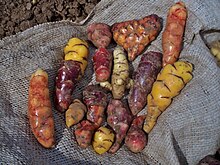酢漿薯
| 酢漿薯 | |
|---|---|

| |
| 黃色及紫色的酢漿薯 | |
| 科學分類 | |
| 界: | 植物界 Plantae |
| 演化支: | 維管束植物 Tracheophyta |
| 演化支: | 被子植物 Angiosperms |
| 演化支: | 真雙子葉植物 Eudicots |
| 演化支: | 薔薇類植物 Rosids |
| 目: | 酢漿草目 Oxalidales |
| 科: | 酢漿草科 Oxalidaceae |
| 屬: | 酢漿草屬 Oxalis |
| 種: | 酢漿薯 O. tuberosa
|
| 二名法 | |
| Oxalis tuberosa | |
酢漿薯(Oxalis tuberosa)是多年生草本植物 ,以地下塊莖越冬。 這些塊莖在克丘亞語稱為uqa, [1]西班牙語稱oca或cubio,還有其他別名,例如新西蘭山藥 。 酢漿薯在安第斯山脈中部和南部種植,以取其塊莖食用。野外並未發現這種植物,但在安第斯山脈中部有四個地區發現帶有較小塊莖之酢漿草屬植物。 [2]酢漿薯在1830年傳入歐洲,作為馬鈴薯的競爭植物,於1860年傳入紐西蘭 。
在紐西蘭,酢漿薯已成為常見的蔬菜,被簡稱為山藥或新西蘭山藥(儘管並非真正的山藥 )。 它有多種顏色可供選擇,包括黃色,橙色,粉紅色,杏色和傳統紅色。 [3]

食用[編輯]
酢漿薯主要食用部位為塊莖。但葉和嫩芽也可以作為綠色蔬菜食用。 成熟的塊莖可以如同大黃一般使用。 [4]安第斯地區有各種加工和準備塊莖的方法,在墨西哥,酢漿薯可與鹽,檸檬和辣椒一起食用。 [3]風味通常略帶濃烈,但不同品種之間的風味差異很大,有些根本不會酸。 [5]未煮熟時質地鬆脆(如胡蘿蔔 ),完全煮熟後質地如同澱粉或粉狀。
酢漿薯的草酸鹽含量很高,集中在塊莖的皮。 [6]不同品種之間草酸鹽濃度差異甚大,安第斯地區農民依此將酢漿薯分為兩種使用。 [2]
一種稱為酸酢漿薯,含有高量草酸。 [2]農民將塊莖加工以便儲存,在蓋丘亞語中稱為khaya 。 [7]首先將塊莖浸入水中約一個月。 然後在炎熱晴天,寒冷夜晚下,置於室外直到完全脫水為止。 在蓋丘亞語中,此用途的栽培品種在被稱為khaya (乾燥後之產品的名稱)或p'usqu (酸/發酵), 在艾馬拉語中稱為luk'i 。
另一類稱為甜酢漿薯,草酸鹽含量較低。 [2]傳統安第斯地區使用方式,是在陽光下曝曬以減少有機酸(草酸)含量,而增加甜味。
每100公克營養 |
新鮮 | 乾燥 |
|---|---|---|
| 熱量 | 255 kJ(61 kcal) | 1,360 kJ(330 kcal) |
| 水 (克) | 84.1 | 15.3 |
| 蛋白質 (克) | 1.0 | 4.3 |
| 碳水化合物 (克) | 13.3 | 75.4 |
| 灰分 (g) | 1.0 | 3.9 |
| 鈣 (毫克) | 2 | 52 |
| 磷 (mg) | 36 | 171 |
| 鐵 (毫克) | 1.6 | 9.9 |
| 視黃醇 (微克) | 1個 | 0 |
| 核黃素 (毫克) | 0.13 | 0.08 |
| 煙酸 (毫克) | 0.43 | 0.85 |
| 維生素C (毫克) | 38.4 | 2.4 |
曝曬後的酢漿薯可以水煮、烘烤或油炸。在安第斯山脈地區,它就像馬鈴薯一樣被用於燉菜和湯中,也可以用作甜點。這類品種在蓋丘亞語中被稱為Wayk'u (煮沸), misk'i (甜/美味),在艾馬拉語被稱為q'ini 。 [2]
酢漿薯含有碳水化合物 , 膳食礦物質和蛋白質 。 [8][9]品種之間的營養成分差異很大。
種植[編輯]


由於易於繁殖,且能耐受貧瘠的土壤,高海拔地區和惡劣的氣候,因此酢漿薯是安第斯高地的重要主食作物之一[3]。
分佈[編輯]
本物種原生於阿根廷西北方、玻利維亞、哥倫比亞、厄瓜多爾、祕魯。並為委內瑞拉所引入栽植[10]。
種下分類元[編輯]
- Oxalis tuberosa subsp. unduavensis (Rusby) Lourteig
同物異名[編輯]
- Acetosella crassicaulis (Zucc.) Kuntze
- Acetosella crenata (Jacq.) Kuntze
- Acetosella tuberosa (Molina) Kuntze
- Oxalis aracatcha Zucc.
- Oxalis arracacha G.Don
- Oxalis chicligastensis R.Knuth
- Oxalis crassicaulis Zucc.
- Oxalis crenata Jacq.
- Oxalis melilotoides var. argentina Griseb.
- Xanthoxalis crassicaulis (Zucc.) Small
- Xanthoxalis tuberosa (Molina) Holub
參考文獻[編輯]
- ^ Teofilo Laime Ajacopa, Diccionario Bilingüe Iskay simipi yuyayk'ancha, La Paz, 2007 (Quechua-Spanish dictionary)
- ^ 2.0 2.1 2.2 2.3 2.4 Bradbury, E.J.; Emshwiller, E. The Role of Organic Acids in the Domestication of Oxalis tuberosa: A New Model for Studying Domestication Resulting in Opposing Crop Phenotypes. Econ Bot. 2011, 65 (1): 76–84. doi:10.1007/s12231-010-9141-0.
- ^ 3.0 3.1 3.2 National Research Council (U.S.). Advisory Committee on Technology Innovation. Lost Crops of the Incas: Little-known Plants of the Andes with Promise for Worldwide Cultivation. National Academies. 1989: 83–92 [2020-04-08]. ISBN 0-309-04264-X. NAP:14292. (原始內容存檔於2021-04-28).
- ^ Oca: Pie. 2014-07-26 [2020-04-08]. (原始內容存檔於2021-04-27).
- ^ Oca: What does it taste like?. 2015-03-26 [2020-04-08]. (原始內容存檔於2021-04-07).
- ^ Albihn, P. B. E.; Savage, G. P. The effect of cooking on the location and concentration of oxalate in three cultivars of New Zealand-grown oca (Oxalis tuberosa Mol). Journal of the Science of Food and Agriculture. 2001, 81: 1027–1033. doi:10.1002/jsfa.890.
- ^ Emshwiller, E. 2006. Evolution and conservation of clonally propagated crops: Insights from AFLP data and folk taxonomy of the Andean tuber oca (Oxalis tuberosa). Pages 308–346 in T. J. Motley, N. Zerega, and H. Cross, eds., Darwin’s Harvest: New Approaches to the Origins, Evolution, and Conservation of Crops. Columbia University Press, New York.
- ^ Hermann, M., & Erazo, C. (2000). Compositional changes of oca tubers following post-harvest exposure to sunlight. CIP Program Report, 391–396.
- ^ King, S.R.; Gershoff, S.N. Nutritional evaluation of three underexploited Andean tubers: Oxalis tuberosa (Oxalidaceae), Ullucus tuberosus (Basellaceae), and Tropaeolum tuberosum (Tropaeolaceae). Econ Bot. 1987, 41 (4): 503–511. doi:10.1007/BF02908144.
- ^ Oxalis tuberosa Molina | Plants of the World Online | Kew Science. Plants of the World Online. [2020-04-09]. (原始內容存檔於2019-07-29).
